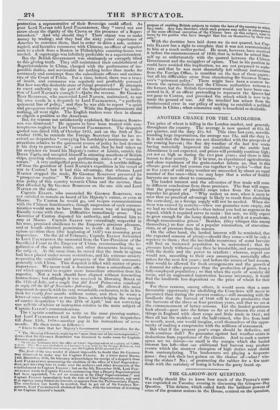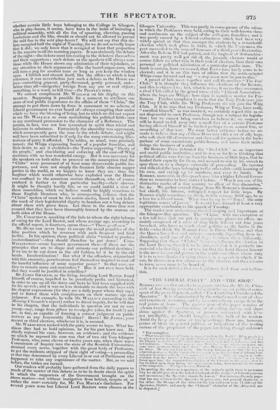THE GLASGOW-BOY QUESTION.
WE really should like to know how much of the PEOPLE'S TIME was expended on Tuesday evening in discussing the Glasgow-Boy Question. This debate, which called forth the brilliant powers of some of the greatest orators in the House, centred on the question,
whether certain little boys belonging to the College in Glasgow, who in play-hours, it seems, have been in the habit of imitating a po •
•
litical assembly, with all the fun of spouting, cheering, passing resolutions and the like, should or should not be allowed to pursue the said fun in the said play-hours? We will not say that this de- bate occupied half the night of Tuesday, for we do not actually know that it did; we only know that it occupied at least that proportion in the reports in all the morning papers. It was obviously the debate of the night—the debate most interesting to the debaters themselves and their supporters ; such debate as the speakers will always con- tinue while the House shows any admiration of their rejoinders, or ally attention to their arguments—like the barrel-organ-men, who still turn a peg for another tune as long as you keep the window open. Childish and absurd itself, like the affairs to which it had reference, it was nevertheless just such a debate as the House en-
joys—something piquant, party-flavoured, gently personal, and— better than all—altogether foreign from any use or real object ; something, in a word, to kill time—the PEOPLE'S TIME.
We cannot compliment Mr. WALLACE on his display on this occasion. Supposing it possible for a moment to attribute one atom of real public importance to the affairs of these " Clubs," the attempt to put them down by force is consonant to no scheme of Liberal government we ever heard of—always excepting that under which we have the blessing of living, but to which we did not expect to see Mr. WALLACE so soon assimilating his political faith--nor to any continued pretension to the character of a Reformer. The motion, in fact, was not less tyrannical in spirit than trivial and ludicrous in substance. Fortunately the absurdity was uppermost, which consequently gave the tone to the whole debate, and might well have been submitted to if only for the many entertaining illus- trations of party it afforded. The tables, as usual, were precisely turned; the Whigs expressing horror of a popular franchise, and their desire to see it abolished—the Tories supporting " liberty ut' the people," and elucidating and enforcing all the cast-off Whig doctrines with no less wonderful energy. But it was necessary for the speakers on both sides to proceed on the assumption that the " Clubs" were possessed of at least some discoverable public im- portance, and were not simply the funniest little obscure supper parties in the world, as we happen to know they are : thus the laughter which would otherwise have exploded over the House
was confined to the conscious orators themselves, who of course confined it further to that particular locality—their sleeves. It might be thought hardly fair, or we could unfold a view of these assemblies, which we believe would be highly vexatious to those English Members who, in unsuspecting reliance that the "Clubs" spoken of must be his nostris similes, found it not below the mark of their legislatorial dignity to hearken out a long debate about them with grave faces. Let them in the mean time rest assured that they have been thoroughly hoaxed by the orators on both sides of the House.
Mr. Cfn.QUII0I3N, speaking of the lads to whom the right belongs of voting for the Lord Rector, and whose average age, according to the official report, is fourteen, opens thus—" These gentlivnen."
3Ir. Hume can never hope to escape the moral penalties of the false position which he assumes with such frequent and fatal facility. In his opinion; these political clubs "tended to produce insubordination"—they should therefore be put down ! Cottle WELLINGTON—COMO bayonet government then—if' these are the principles that are to shape and animate our political destinies ! If we are to be cut down in the old fashion, let it be by the old bands. Insubordination ! But what if the offenders, stigmatized with this enormity, peradventure ibel themselves inspired to cast off the baneful influence of some superior power' In that case, are they to remain mute and motionless ? Has it not even been held, that they would be justified in rebellion? Sir JAMES GRAHAM, as the living, breathing Lord Rector, found himself, of course, impelled to be peculiarly prolix and historical, in order to use up all the dates and facts he had been supplied with for his speech ; and it was no less desirable to dazzle the boys with his elegant expressions (for they see a daily paper where they sup), anal to flatter them with compliments on their mature age and judgment. For example, lie tells Mr. WALIACE (according to the Morning Chronicle's report) rather to dread inquiry, for he will find to his chagrin, that the individuals in question are not so very young—nay, range fromMeen to twenty fire (alas, for truth !) and are, in tine, as capable of forming a correct judgment on public matters as any honourable Member! Bravo ! Sir JAMEs ; your second or third election, whichever it is, is secured. Mr. Wattnmerost ranked with the party averse to boys. What bu- siness they had to bold opinions, he for his part knew not. Ile chiefly reposed his Case, however, on evidence ; and the evidence on which he reposed his case was that of two old Tory Glasgow Professors, who, some eleven or twelve years ago, when there was a Commission of Inquiry into the state of the Scottish Universities, strained every nerve, together with the great body of Professors, to get the students stripped of their right of voting—a proceeding at that time denounced by every Liberal in or out of Parliament who happened to take any cognizance of the matter. But, as we said before, the tables are turned.
Our readers will probably have gathered from the daily papers so much of the matter of this debate as to be in doubt about the spirit in which the supporters of the Government brought on the above motion—not without instigation from behind, despite of; or rather the more certainly for, Mr. Fox MAPLE'S disclaimer. For several years none but Liberal Lord Rectors were chosen at the Glasgow University. This was partly in consequence of the °dime in which the Professors were held, owing to their well-known views and sentiments on the subject of the collegiate franchise; and it was partly caused by a Liberal enthusiasm which had beau very widely spread at that time amongst the students by a remarkable
election which took place in 1828, in C ■steussi, the poet succeeded to the unusual honours of a third year's Rectorship. After the Reform Bill had passed, and the bugbear of disfranchise- ment was pretty well got rid of, the juvenile electors would of course follow no other rule in their task of election, than their own personal or political admiration of a particular public man. The truth is certain, however caused, that Tueies have lately come to be elected ; and it is on this turn of affairs that the noble-minded Whigs come forward and say " a stop must now be put. to this
A parcel of lads meet together mid call themselves "The Peel Club;" it is thought they influence the elections of the Rectors, and this is objected to ; but, what is worse, it seems they overmatch a rival Club called by the grand name ()film "Liberal Association," where the boys arc Whigs : here then is =Mk st matter tar Par-
liament. Further complaint is made that the Tory Professors joie the Tory Club, while the Whig Professors do not juin the Whig Club. It' it be true that any Professor, Whig or Tory, have really " enrolled himself:" as was asserted, we certainly regard this as an act disgraceful to such Professor, though not a subject for legisla- tion : but we cannot bring ourselves to believe it; we suspect it will be found to fiat away into a small fact of a certain Professor having allowed himself' to be invited perhaps to en annual fête, or something or that sort. We want better evidence before we arc made to believe that any of these Dons mix with a set of silly buys, who talk their fill of nonsense and then call for oysters in the back- parlour of some second-rate public-house, and name their united doings the business of a club.
Sir ROBERT PEEL defended the " Peel Club " as an important
and useful public institution ; and he was su far from thinking that political affitirs were fareian from the business of little boys, that he lauded their capacity for dean, end seemed to aim by his speech to spur them on to a sharper animosity of proceeding. lie taunted and ridiculed the boys belonging to the other club—still boasting of his own, and crying up its numbers, and even its funds. Sir ROBERT, moreover, in this speech rose into a higher Liberal fervour than we remember to have neticed. before. " Was it not one of the distinctive marks of a fire country to allow of free discussion," &c. &c. We gather several things from Sir Roautafs discoursd- but chiefly his intense, unfeigned. respect for little boys. Sir ROISERT might somietime, %ye thick, in this stranse fitful age, be at a loss for a liberal toast. What doci, he say to—"lloys! the only legitimate source of power." It would have formed at least a very appropriate conclusion to his speech of Tuesday. The reader now undessttinds tho: till bearing and importance of the Glasgow-Buy question. The ('labs," with the exception of a few tall to s that are put in conspicuous places for effect, are 1 ofa crew of dirty little fellows not four years
mainly compose(
breeched, who know as much tthout pulities as the lambs in the fields—who think Sir lloneter Pees is Prime Minister, and that the Queen has it lion and unicorn constantly depending from her shoulders, until one of the tail boys lustruets them differently. Supposing t1tat these " Clubs," lot:0o r, influence the tleetion of the Lord Rector, then it is to ho o!' , ed that it is perfectly im- material ■shetiter they slot or is,e tlor that the Lord Rector himself is the most immaterial isetson ill t1t,. eorld—an officer whose duty it is to return f a. being (lees i. ill it speech in which, it' he can, he throws ill a few allusiuus to the classics, and then rourns to town, timer more to he heat t et; It is fin' such debates tird our lt.is!ator find time and inclina- tion.



























 Previous page
Previous page